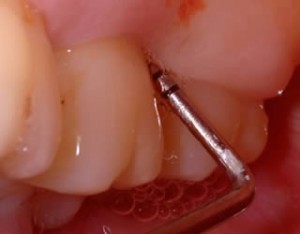Gum Disease – A Common Dental Problem
How to prevent gum disease and how we can treat it at our Ipswich dental clinic
 Some people may think that the health of their gums comes secondary to the health of their teeth and whilst this is understandable to some degree, it isn’t really correct. We may want our teeth to look as nice as possible and not cause a painful toothache that keeps us awake all night, but it’s well worth understanding that a nasty infection of the gums can cause us some fairly serious problems too.
Some people may think that the health of their gums comes secondary to the health of their teeth and whilst this is understandable to some degree, it isn’t really correct. We may want our teeth to look as nice as possible and not cause a painful toothache that keeps us awake all night, but it’s well worth understanding that a nasty infection of the gums can cause us some fairly serious problems too.
Although some degree of gum disease is likely if we neglect our oral health regime for a time, perhaps due to being ill, it will usually revert again once we commence brushing and flossing properly. That said, even when we brush regularly, it can still occur, which is why we always recommend that our patients see the Foxhall Dental Practice oral hygienist on a six monthly basis for a professional clean and advice.
Potentially harmful bacteria
Our mouths are full of bacteria, some of it good and some not so good. Generally, if we maintain a healthy balanced lifestyle and good cleaning, this will not be a problem. If we neglect them though, or due to external causes such as illness, the potentially harmful bacteria can grow significantly in numbers and then start to attack our gums, leading to gum disease.
There are a number of things that we can do to keep the number of potentially harmful bacteria down to a healthy level. The most obvious of these is to brush our teeth well. Even if you think you already do this, it is worth making sure that the bristles on your toothbrush aren’t worn (usually no more than 3 months old). Make sure too, to angle the bristles so they reach beneath the gumline, helping to rid them of food particles and bacteria. Flossing too, should be an important part of your daily oral health care routine so if you don’t already, you should start to floss between your teeth too.
Dehydration can also cause bacterial numbers to increase. You should not only make sure that you stay well hydrated by drinking plenty of water, but also avoid smoking and excess alcohol consumption as these are well known to cause a dry mouth which prevents bacteria from being flushed away efficiently.
Treatment of gum disease
There are two key stages of gum disease; the earlier stage called gingivitis and a more advanced stage called periodontitis. Gingivitis is usually treatable without too much difficulty, but periodontitis is another matter altogether.
Treatment for gingivitis
In most cases, gingivitis will be quite mild. It can still cause some unpleasant symptoms though, such as sore and inflamed gums, bleeding from the gums when brushing and smelly breath. It is usually treated by our Ipswich oral care hygienist who will provide you with a scale and polish procedure. This will remove any tartar from the teeth and gum line. Tartar is made up of dead bacteria and mineral deposits that form a rough surface on your teeth which enables bacteria to collect more easily. Because tartar naturally builds up, however well we brush at home, patients should visit the hygienist every six months as a preventative measure.
Treatment for periodontitis
Periodontitis is a much more problematic stage of gum disease as it not only affects our gums but also causes infection around the roots of the tooth and the surrounding bone tissue.
Once gum disease reaches this stage, not only will the symptoms be more pronounced, but there is a real risk that you may lose teeth as well. There is also some evidence that gum disease can affect your general health and increase your risk of heart problems amongst other things.
At this stage, a straightforward scale and polish procedure will not suffice and you will need to be treated by a suitably qualified specialist dentist for a ‘root planing’ or ‘deep clean’ procedure. This involves accessing the tooth below the gum line and cleaning around the roots of the teeth and the bone. This is a much more invasive treatment that has to be done using a local anaesthetic. Even though this is the only treatment available, it does not have a 100% success rate and tooth loss is still possible. It pays therefore, to make sure that you look after your gums well enough to avoid the need for this treatment.
As part of your overall oral health care, you should make sure that you see a dentist to have your teeth checked on a regular basis. As mentioned, we also strongly recommend that you see one of the hygienists at our Ipswich practice for regular professional cleaning. This will help to really keep your mouth in good health. To make an appointment for either, please call the Foxhall Dental Practice on 01473 258396.
